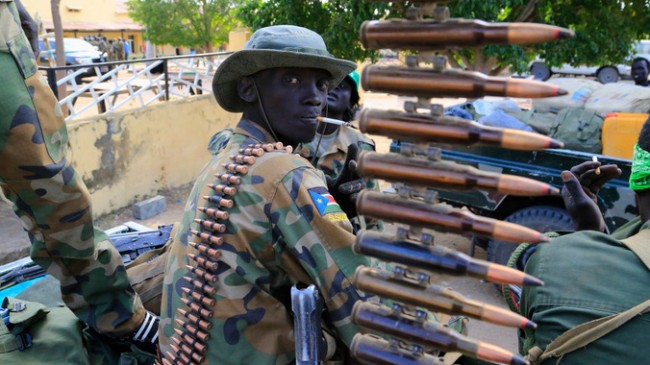Peace talk delegates from both sides of the conflict in South Sudan arrived in Ethiopia as Bor was taken by White Army rebels Tuesday.
At dawn Tuesday, conflict broke out between the Sudan People’s Liberation Army and the White Army rebels just outside of the city of Bor, capital of Jonglei state. The rebels managed to retake Bor after heavy gunfire. This battle flew in the face of a deadline demanded by the African Union and the South Sudanese President, Salva Kiir, for cessation of hostilities
The news was first reported by text messages sent by one of Machar’s aides, Moses Ruai, and confirmed by Bor residents independently. The government later confirmed that the rebels had taken the city after a long period of silence on the matter.
Bor city is seen as a strategic location and a gateway to the capital, Juba.
Aguer had made statements over previous days that he anticipated the White Army was preparing to make a fresh attack on Bor, but that Aguer was confident the rebels would be prevented from taking the town. The progress of the White Army across Jonglei state towards Bor had been monitored over their days travel.
Many civilians have fled and are fleeing Bor to neighboring states and to the UNMISS compound just outside Bor. UN reports state that the UNMISS compound resident population has fallen from 17 000 last week to 8000 Monday, as people are moving to other locations.
Bor airport has been closed for the second time.
A meeting between representatives of the South Sudan government and Machar’s forces have arrived in Addis Abada, Ethiopia to negotiate an end to the civil violence.
Machar, who is currently in hiding, was clear that he would not meet with Kiir directly–at least until after the Addis Abada talks–and warned that his forces would continue to fight.
“Our forces are still marching on Juba, there is no cessation of hostilities yet,” said Machar by satellite phone, explaining also that any cessation of fighting would need to be negotiated. Machar expected that the Addis Abada talks would have this purpose.
Huusein Mar Nyout is among the delegation for Machar. Machar also publicly named Rebecca Nyandeng, the widow of John Garang, but she later said that she wasn’t leading the delegation to Addis Abada.
IGAD, the East African development organization, has been demanding that Machar cease hostilities by Tuesday. IGAD is also pressuring the Kiir government to release his political prisoners. IGAD has threatened possible sanctions.
The African Union stated that it would, “take appropriate measures, including targeted sanctions, against all those who incite people to violence, including along ethnic lines.”
Tuesday IGAD announced to Reuters that both sides had agreed to cease hostilities, but there no timeframe for such a cessation was detailed.
Machar has responded that he and his group welcome IGAD’s calls for cessation of hostilities: “We are ready to ceasefire immediately to stop the bloodletting once the Government of Salva Kiir reciprocates,” said a statement written by the rebels.
Machar warned regional leaders, however–particularly Uganda’s President Yoweri Museveni–against involving themselves in the conflict. Machar warned that such involvement would only fuel hostilities and compromise IGAD’s position as a peace broker between the two warring parties.
Museveni had been the most vocal of the East African leaders who had participated in talks with the South Sudan government last week dealing with conflict resolution plans. Museveni had frankly warned Machar that Machar must stop within the four days given him or face defeat.
Machar also has repeatedly stated that he will not negotiate with Kiir unless certain political leaders held by Kiir are released. The political leaders were jailed in the early days of the conflict in Juba.
Machar’s delegates to Addis Abada as well as the African Union have urged Kiir to release these prisoners. Nyout pointed out that by keeping the men prisoner while stating a desire for peace, Kiir was not projecting a good message.
Other recent developments in South Sudan: Unity State, a major oil producing region, has seen a partial shutdown of operations, according to the Ministry of Petroleum. Central Equatoria State’s curfew has been extended to 8 p.m. instead of 6 p.m.
Aid Agencies taking care of South Sudanese refugees are calling for more funds and expressing concerns over lack of water, food, sanitation, and medicine. Awerial County, Lakes state, has issued warnings of a humanitarian emergency due to lack of food, water, and shelter for the thousands of people who have arrived there. Over 60 000 people from Bor and Janlei state in general have moved into Lakes state.
Peace talks are expected to start Wednesday in Addis Abada, Ethiopia, and will be participated in for the first time by both sides of the South Sudan conflict, one day after rebels retook several positions, including the highly contested city of Bor in Jonglei state.
By Day Blakely Donaldson
Sources:
Land and Sea Journal
Sudan Tribune
Voice of America
Radio Miriya
Yahoo
